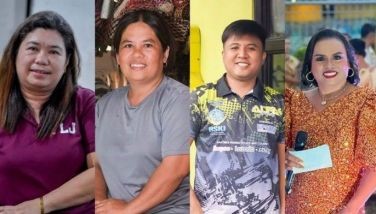His Majesty King Bhumibol Adulyadej's 81st Birth Anniversary and the National Day of Thailand
Strength of the Land
His Majesty’s activities concerning development
“Chitralada Villa, Dusit Palace,” the royal residence of His Majesty King Bhumibol Adulyadej, the ninth monarch of Thailand’s Royal House of Chakri, is unique in that it is an experimental site for His Majesty’s Royal Chitralada Projects in such fields as agriculture, forestry and small-scale industries. Rice fields, groves, livestock enclosures, fish ponds, a rice-mill and a dairy factory can be seen in the palace grounds. When successful, the results of these experiments will be publicized so that people and organizations can make use of them. Students, farmers, the general public and even foreign visitors pay regular visits to observe the operation of the projects.
Throughout the 60 years since his accession to the throne, His Majesty has paid regular visits to his Thai citizens in all the regions, especially in remote and impoverished areas. As a result, more than 3,000 royal-initiated projects have been set up since 1952. These projects can be divided into water resource development projects to facilitate farming; the construction of roads to transport goods to market; research to find new plant species suitable for the terrain; at the same time there must be projects involving the administration and management of natural resources — soil, water, and forests — so that they may be sustainable. There are also projects concerning the economy, society, public health and supplementary occupations.
Philosophy of Sufficiency Economy
“Sufficiency Economy” is a philosophy that stresses the middle path as an overriding principle for appropriate conduct by the populace at all levels. This applies to conduct starting from the level of the families, communities, as well as the level of nation in development and administration so as to modernize in line with the forces of globalization.
It can be summarized that the target of the numerous royal-initiated projects is the development of “Man,” to be self-reliant. Therefore, His Majesty’s approach involves step-by-step development, that is, the initial stage urgent problems must be solved first, and other issues are dealt with gradually. The projects must also be economical. His Majesty aims to make the village communities strong first before they can expand.
“Economic development must be done step by step. It should begin with the strengthening of our economic foundation, by assuring that the majority of our population has enough to live on... Once reasonable progress has been achieved, we should then embark on the next steps, by pursuing more advanced levels of economic development. Here, if one focuses only on rapid economic expansion without making sure that such plan is appropriate for our people and the condition of our country, it will inevitably result in various imbalances and eventually end up as failure or crisis as found in other countries.” (Royal Speech, 1974)
One of His Majesty’s significant principles is that the development must be suitable to the geographical and social conditions. There must be proper promotion of knowledge and modern technology. The developments must be based on the principles of sustainable conservation and the development of natural resources.
His Majesty believes “Sufficiency Economy is the use of what we have in a correct and suitable way.” It is a philosophy that serves as a guideline of how to live and behave for people at all levels from the family, the community, to the governmental level, both in developing and administering the country.
In the initial stages, the royal-initiated projects often stressed the construction of the infrastructure. Subsequently, His Majesty set up the six Royal Development Study Centres to represent the different geographical conditions of each region, so that they may be One Stop Service centres for the farmers for study and research. The results of the successful studies are demonstrated as a living natural museum, a comprehensive exhibition showing all aspects of life. Visitors can observe new technologies and the economical and sustainable use of natural resources. Those interested may seek knowledge at all times and make a request to be trained in the subjects they desire.
His Majesty’s New Theory proposes guidelines for the proper management of limited natural resources to achieve optimum benefit. It has been estimated that Thai farming households, consisting of four to five members each, own approximately 15 rai (24,000 square metres) of land per household. The New Theory thus divides the land into four parts; 30 percent for digging a pond to collect water to be used for cultivation in the dry season, and to raise fish as well; 30 percent for rice cultivation sufficient for all year round home consumption; 30 percent for integrated field and garden crops, and fruits; and 10 percent for housing and constructions for other activities such as livestock enclosures, mushroom nursery and roads.
When the New Theory is carried out, in the first year the farmers will have all the food they need for consumption. They are basically self-reliant concerning food and also have work to do all year round. When successful, some farmers will follow the second phase of the New Theory by forming groups to sell their surplus, thereby initiating production, marketing and social grouping, resulting in a cooperative. This leads to the third phase of the New Theory, which involves an expansion of operation to facilitate a higher level of business dealing, requiring funding from outside sources such as banks or private companies to set up funds to carry out activities for further benefit.
In developing the country, His Majesty has adhered to the natural principle, in which people employ natural resources available in each locality. The results are very satisfactory, for example, growing vetiver grass to prevent the erosion of top soil, as well as to conserve soil and water; improving deteriorated soil for natural farming; reforestation without planting; building check dams in the forests to conserve watershed areas; and using water hyacinth to solve the problem of polluted water. The simple operations of these projects have resulted in the balance of the entire ecological system and led to sustainable development. The Royal Development Study Centres and various other projects have therefore been visited not only by practitioners but also by heads of state, prime ministers, as well as leaders of many countries, including Her Excellency President Gloria Arroyo of the Republic of the Philippines.
- Latest

























